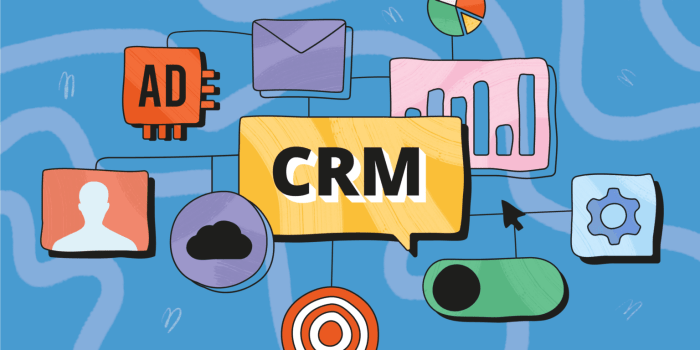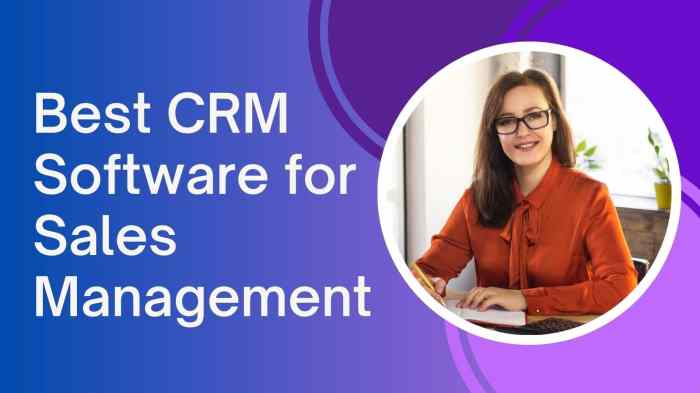Crm software for sales and marketing – In today’s competitive business landscape, efficient customer relationship management (CRM) is no longer a luxury but a necessity. CRM software empowers sales and marketing teams to streamline processes, improve customer interactions, and ultimately drive revenue growth. This comprehensive guide delves into the world of CRM, exploring its functionalities, benefits, selection criteria, and frequently asked questions.
Understanding CRM Software: More Than Just a Contact List
CRM software is a centralized system designed to manage all interactions with current and potential customers. It goes beyond simply storing contact information; it provides tools for managing leads, tracking sales progress, automating marketing campaigns, and analyzing customer data to gain valuable insights. Effective CRM implementation fosters stronger customer relationships, leading to increased customer loyalty and higher conversion rates.

Source: snov.io
Key Features of a Robust CRM System:, Crm software for sales and marketing
- Contact Management: Centralized storage and organization of customer data, including contact details, communication history, and purchase history. This facilitates personalized communication and targeted marketing efforts.
- Lead Management: Tracking potential customers from initial contact through the sales pipeline, assigning leads to sales representatives, and nurturing them until conversion. This streamlines the sales process and improves sales efficiency.
- Sales Automation: Automating repetitive tasks such as email marketing, appointment scheduling, and follow-up communications, freeing up sales teams to focus on higher-value activities.
- Marketing Automation: Automating marketing campaigns, segmenting audiences based on demographics and behavior, and personalizing communication for improved engagement and conversion rates. This includes email marketing, social media marketing, and other digital marketing channels.
- Reporting and Analytics: Generating reports and dashboards to track key performance indicators (KPIs), analyze sales trends, and measure the effectiveness of marketing campaigns. This data-driven approach enables informed decision-making and continuous improvement.
- Customer Service Integration: Integrating with customer service tools to provide a seamless customer experience across all touchpoints. This allows for efficient issue resolution and improved customer satisfaction.
- Integration with other business tools: Seamless integration with email marketing platforms, social media management tools, e-commerce platforms, and other business applications to create a unified view of the customer.
Benefits of Implementing CRM Software for Sales and Marketing
The advantages of adopting a robust CRM system are numerous and far-reaching. Here are some key benefits:
- Improved Sales Productivity: Automating tasks and streamlining workflows frees up sales representatives to focus on closing deals and building relationships.
- Increased Sales Revenue: Improved lead management, targeted marketing, and personalized communication contribute to higher conversion rates and increased revenue.
- Enhanced Customer Satisfaction: Personalized communication, efficient issue resolution, and proactive customer service foster stronger customer relationships and improved loyalty.
- Better Marketing ROI: Targeted marketing campaigns, data-driven insights, and automated processes improve the return on investment for marketing efforts.
- Improved Team Collaboration: Centralized data and communication tools facilitate better collaboration between sales and marketing teams.
- Data-Driven Decision Making: Comprehensive reporting and analytics provide valuable insights into customer behavior, sales trends, and marketing effectiveness, enabling informed decision-making.
- Scalability and Flexibility: CRM systems can adapt to the changing needs of a growing business, ensuring long-term value.
Choosing the Right CRM Software: Factors to Consider
Selecting the right CRM software requires careful consideration of various factors:
- Business Size and Needs: Consider the size of your business, the number of users, and the specific functionalities required.
- Budget: CRM software solutions range in price from affordable cloud-based options to enterprise-level systems with substantial upfront costs.
- Integration Capabilities: Ensure the CRM system integrates seamlessly with your existing business tools and applications.
- User-Friendliness: Choose a system that is intuitive and easy to use for your team members.
- Scalability: Select a system that can adapt to the changing needs of your business as it grows.
- Customer Support: Ensure the vendor provides reliable customer support and training.
- Security: Prioritize a system with robust security features to protect sensitive customer data.
Types of CRM Software:
CRM software comes in various forms, each with its own strengths and weaknesses:

Source: solidperformers.com
- Cloud-based CRM: Accessed via the internet, offering flexibility and scalability. Examples include Salesforce, HubSpot, Zoho CRM.
- On-premise CRM: Installed and maintained on a company’s own servers, offering greater control but requiring significant IT infrastructure.
- Open-source CRM: Free to use and customize, but may require technical expertise to implement and maintain. Examples include SuiteCRM, SugarCRM.
Frequently Asked Questions (FAQ)
- Q: What is the cost of CRM software? A: The cost varies greatly depending on the features, scalability, and vendor. Cloud-based options typically offer subscription-based pricing, while on-premise solutions involve higher upfront costs.
- Q: How long does it take to implement CRM software? A: Implementation time depends on the complexity of the system and the size of the business. It can range from a few weeks to several months.
- Q: What are the key metrics to track with CRM? A: Key metrics include lead conversion rate, customer acquisition cost, customer lifetime value, and customer churn rate.
- Q: How can I ensure successful CRM implementation? A: Successful implementation requires careful planning, user training, data migration, and ongoing support.
- Q: What are some examples of popular CRM software? A: Popular options include Salesforce, HubSpot, Zoho CRM, Microsoft Dynamics 365, and Pipedrive.
Conclusion: Crm Software For Sales And Marketing
Investing in the right CRM software is a strategic move that can significantly impact the success of your sales and marketing efforts. By carefully considering your business needs, budget, and integration requirements, you can choose a system that empowers your teams, enhances customer relationships, and drives sustainable growth. Remember to prioritize user-friendliness, scalability, and robust security features when making your selection.
References:
Call to Action:
Ready to transform your sales and marketing processes? Contact us today for a free consultation to discuss your CRM needs and find the perfect solution for your business.
Query Resolution
What are the key features to look for in CRM software?
Key features include contact management, lead tracking, sales pipeline visualization, marketing automation capabilities, reporting and analytics dashboards, and integration with other business tools.
How much does CRM software typically cost?
Pricing varies widely depending on the features, number of users, and vendor. Options range from free, basic plans to enterprise-level solutions with significant monthly or annual fees.
How long does it take to implement CRM software?
Implementation time depends on the complexity of the system and the size of the business. It can range from a few weeks to several months.
What kind of training is needed for CRM software?
Most vendors offer training resources, including online tutorials, webinars, and in-person workshops. The level of training required will depend on the software’s complexity and the users’ technical skills.
Can CRM software integrate with other business applications?
Yes, many CRM systems offer integration capabilities with other applications, such as email marketing platforms, accounting software, and e-commerce platforms. This allows for a more streamlined workflow and data consistency.
